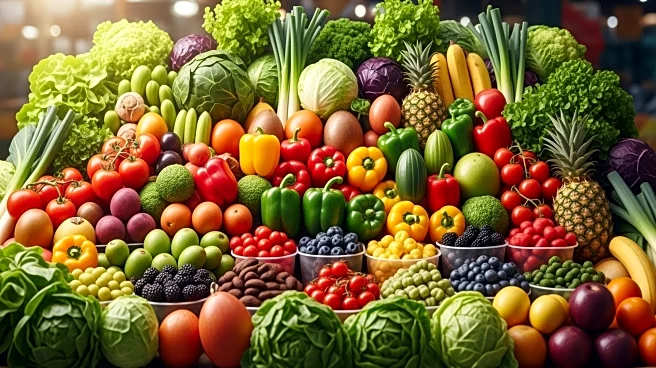What's Happening?
The Food and Agriculture Organization of the United Nations (FAO) held a high-level event at the World Food Forum 2025 in Rome to accelerate the implementation of the One Country One Priority Product (OCOP)
Initiative. Launched in 2021 by FAO Director-General QU Dongyu, OCOP aims to strengthen the value chains of crops, forestry, fishery, and livestock products. The initiative empowers countries to promote Special Agricultural Products (SAPs) with high potential for sustainable development, contributing to resilient and inclusive agrifood systems worldwide. Currently, 95 countries are promoting 56 SAPs across various regions. The event showcased ongoing projects, reinforced political commitment, and enhanced technical collaboration among governments, research institutions, and the private sector.
Why It's Important?
The OCOP initiative is significant as it addresses global challenges in agrifood systems by promoting sustainable development and resilience. By focusing on SAPs, countries can drive inclusive growth, connect farmers to markets, and provide healthier food options to consumers. The initiative supports small-scale farmers and rural communities, helping them overcome production challenges and structural constraints. It also aims to improve farmers' livelihoods, enhance access to nutritious food, and reduce environmental impacts. The initiative's success relies on partnerships among key players, including governments and private sectors, to achieve meaningful change in agrifood systems.
What's Next?
The OCOP initiative is set to expand its reach and impact, with ongoing projects transforming value chains across diverse ecological and cultural contexts. Countries like Lesotho, Bangladesh, and China are already seeing benefits from the initiative, with improved market access and strengthened domestic seed systems. The initiative is supported by over $20 million in funding, including contributions from China through the FAO-China South-South Cooperation Programme. OCOP aims to strengthen synergies with other FAO flagship initiatives, such as Hand-in-Hand, Digital Villages, and Green Cities, to further accelerate progress in sustainable agrifood transformation.
Beyond the Headlines
The OCOP initiative highlights the importance of collective action and partnerships in driving sustainable development. It offers scalable models for agrifood transformation, adapting to diverse ecological and cultural contexts. The initiative aligns with the FAO Strategic Framework 2022-31, advocating for better production, nutrition, environment, and life, ensuring no one is left behind. By focusing on SAPs, OCOP contributes to global efforts to tackle food security, environmental sustainability, and economic development challenges.










